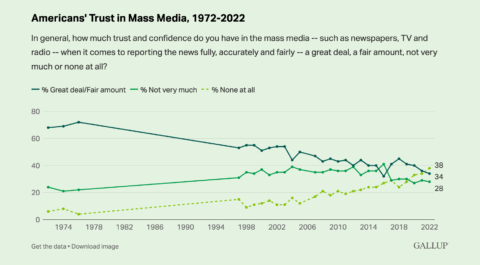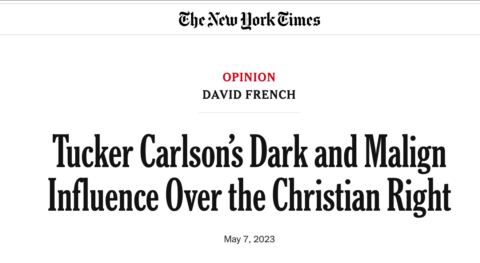I’ve largely ignored the entire Bud Light tempest in a toxic teacup because social media outrages and brand boycotts come and go and tend to leave little trace behind. But the fuss over the beer brand’s brief commercial dalliance with trans newbie Dylan Mulvaney — with her 10.8 million TikTok followers — nonetheless fascinates. It shows, it seems to me, just how much everyone is projecting, and how (almost) everyone is getting it wrong.
There are, it seems, many layers to Dylan. To countless straight people, left and right, Dylan is a transgender star — because she is biologically male, and yet has been saying she is a girl now for more than a year, wears women’s clothes and is pretty and charming and full of manic energy. (I’m mostly using her preferred pronouns here, the least clumsy option). The woke left therefore loves her, and the Matt Walsh right has had a collective aneurysm. But for many gay men, including yours truly, Dylan’s latest, year-long performance as a “girl” looks and sounds like something much more familiar.
Dylan, to us at least, is a pretty classic, child-actor, musical theater queen — an effeminate gay man who finds great joy and relief in Broadway camp and drama, and is liable to burst into song at any moment. (I used to wonder if this very specific manifestation would die out as gays integrated more. But no! It seems to be in our collective DNA. Every generation mints a new variety.) And she’s managed to bait both the woke left and the anti-woke right into making her very famous and a lot richer than a year ago.
It’s a triumph of performance and marketing. It can be frustrating for a young actor among so many. You can do your best, become a finalist in Campus Superstar in 2018, wear only briefs for a performance at Joe’s Pub, perform, however well, in the cast of Book Of Mormon, camp it up for Ellen, or do the exact same ditzy-girl act on The Price Is Right as a man (Dylan’s previous attempts at fame). But become a parody of a “girl” and provide breathless, daily updates on your transition — and nearly 11 million people on TikTok will follow. At the same time brand yourself as a pioneer for greater understanding, love, and civil rights … and you can get an extended interview on The Today Show and an audience at the White House.
The gimmick was simple: a TikTok clip for every day of “becoming a girl.” As Dylan explained:
When the pandemic hit, I was doing the Broadway musical Book of Mormon. I found myself jobless and without the creative means to do what I loved. I downloaded TikTok, assuming it was a kids’ app. … [R]ight before I started creating content with “Days of Girlhood”, I thought, “What am I going to do to afford my rent this month?”
Well, she no longer has to worry about that. Dylan has brand partnerships with Anheuser-Busch, Nike, Crest, Instacart, Ulta Beauty, Kate Spade and many more. And here is what Dylan means by “becoming a girl” in his/her own words. Trigger warning for feminists:
Day One of being a girl and I’ve already cried three times, I wrote a scathing email that I did not send, I ordered dresses online that I couldn’t afford, and then, uh, when someone asked me how I was, I said I’m fine — when I wasn’t fine [applies lip gloss]. How’d I do, ladies? Good? Girl power!
If you think this has to be a joke, a parody making fun of sexist ideas about women, you’re not the only one. (Trans YouTuber Blaire White also assumed it was a spoof at first, and her video on Dylan’s “womanface” is well worth a watch.) But no! Here’s more:
“Hangin with the girlieeees, woohoo! [The camera pans across a series of dolls sitting in chairs] … I almost bought this Audrey [Hepburn] portrait. I just love her, she’s everything I want to be.”
“Day Three of being a girl and I’ve already become a bimbo. … I think it’s a good fit for me. What do you think, ladies?”
“Day Four of being a girl and I’m exhausted — the hair, the makeup, the clothes, the high heels. It’s a lot to keep up with!”
“Day 12 of being a girl and I just picked up some tampons.”
She never subsequently seems to put them down. At one point, we see Dylan hiking in high heels, and running hysterically away from a flying bug. In another clip, she dresses up in a skimpy evening gown and fantasizes about her future husband:
I want them to know I’ll be their cheerleader on and off the field. So they can picture me walking down the aisle to be their trophy bride, or trophy wife. I would totally be good at that, don’t you think? “Dinner’s ready! Yoo-hoo!”
Call me a transphobe, but I just don’t think that someone who has been struggling with gender identity her whole life and found a pathway to womanhood … would ever celebrate it quite like that. Yet this firehose of misogynistic tropes was one of a handful of people who were invited to the White House to interview Biden personally.
The only thing more absurd than this was the far right falling for the whole schtick as well. After the Bud Light ad, Kid Rock filmed himself shooting cases of beer with a semi-automatic rifle; a businessman opted for a baseball bat in an ad to promote his new “Ultra Right” beer; bomb threats rattled some Bud factories; countless tweets popped up alleging a collapse in sales of Bud Light; then the Trumps went to war with Matt Walsh because Anheuser-Busch is a major GOP donor; then the former cover-girl, current Fox News star Caitlyn Jenner called Dylan’s act an “absurdity“; and so on. Good times.

















